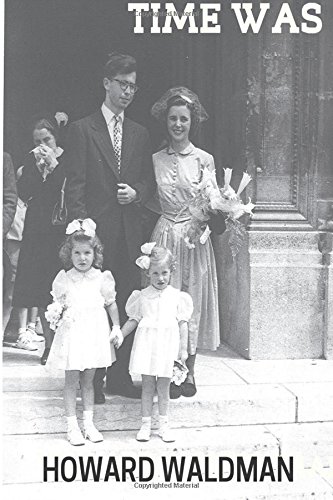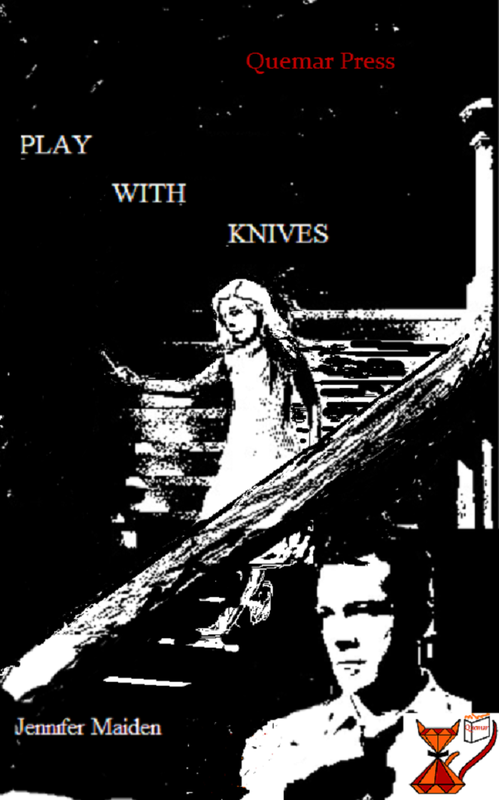 The editor of Metaphor Issue 5 has succeeded in assembling a group of fine poets. Poets representing a volume of diverse voices. Poems in this volume are varied. Some are philosophical, addressing social justice and others speak to our daily lives and myriad experiences. The writing is esthetically rich in content and well crafted.
The editor of Metaphor Issue 5 has succeeded in assembling a group of fine poets. Poets representing a volume of diverse voices. Poems in this volume are varied. Some are philosophical, addressing social justice and others speak to our daily lives and myriad experiences. The writing is esthetically rich in content and well crafted.
Jennifer Maiden on Play With Knives
Poet and novelist Jennifer Maiden drops by to read from her latest novel Play With Knives: Three: George and Clare and the Grey Hat Hacker, and to talk about all three novels in the Play With Knives series, about the joy…
A review of Time Was by Howard Waldman
 Time Was is not your usual birth to death autobiography. Waldman’s haphazard style is unique and somehow manages to be both lighthearted and dark at the same time, but these vignettes have an otherworldly quality about them. The subtitle is appropriate as the disconnected voice of the narrator is not only out of time and out of place, it is one that invites the reader to that liminal space.
Time Was is not your usual birth to death autobiography. Waldman’s haphazard style is unique and somehow manages to be both lighthearted and dark at the same time, but these vignettes have an otherworldly quality about them. The subtitle is appropriate as the disconnected voice of the narrator is not only out of time and out of place, it is one that invites the reader to that liminal space.
A review of the Play with Knives trilogy by Jennifer Maiden
 All three novels explore guilt and innocence, good and evil, and the individual versus the state or government, using changing tense and viewpoints. The grand conception is fairly ambitious, but Maiden handles it all smoothly and the stories read like ordinary thrillers. The binaries that charge these books are played with in all sorts of interesting ways as the characters swap positions, power matrices, emotional landscapes, and unravel the structures in which they work.
All three novels explore guilt and innocence, good and evil, and the individual versus the state or government, using changing tense and viewpoints. The grand conception is fairly ambitious, but Maiden handles it all smoothly and the stories read like ordinary thrillers. The binaries that charge these books are played with in all sorts of interesting ways as the characters swap positions, power matrices, emotional landscapes, and unravel the structures in which they work.
A review of Figuring in the Figure by Ben Berman
 Ben Berman’s Figuring in the Figure offers a window into his personal life. In reading the poems, we learn that Berman is a young father and that he is a wizard at word play, among other things. The poems are written in the terza rima form, a rhyme scheme of Italian origins and used by Dante Alighieri. This form allows Berman to showcase is proficiency as a poet.
Ben Berman’s Figuring in the Figure offers a window into his personal life. In reading the poems, we learn that Berman is a young father and that he is a wizard at word play, among other things. The poems are written in the terza rima form, a rhyme scheme of Italian origins and used by Dante Alighieri. This form allows Berman to showcase is proficiency as a poet.
A review of Beginning French by Les Américains
 The writing is so descriptive and uncomplicated that is easy to imagine accompanying the family as they go from one lesson to the next. We go with them to buy furniture, buy food at the hypermarket, get the boiler fixed and tag along on their trips to the Dordogne and some wonderful French towns and villages. We experience the history, the culture and the environment through Marty and Eileen’s exquisite travelogues and memories. And if you think I have forgotten to mention the French food then you are in for a huge surprise.
The writing is so descriptive and uncomplicated that is easy to imagine accompanying the family as they go from one lesson to the next. We go with them to buy furniture, buy food at the hypermarket, get the boiler fixed and tag along on their trips to the Dordogne and some wonderful French towns and villages. We experience the history, the culture and the environment through Marty and Eileen’s exquisite travelogues and memories. And if you think I have forgotten to mention the French food then you are in for a huge surprise.
A review of The Chaos of Mokii by Geoff Nelder
 At a deeper level, there are questions raised about the nature of reality that are chillingly relevant considering the fact that last year Elon Musk stated publically that there is a billion to one chance that we’re living in “base reality” (that is, a non-virtual world), and even Neil deGrasse Tyson has argued that there is a high probability that we’re living a computer simulation.
At a deeper level, there are questions raised about the nature of reality that are chillingly relevant considering the fact that last year Elon Musk stated publically that there is a billion to one chance that we’re living in “base reality” (that is, a non-virtual world), and even Neil deGrasse Tyson has argued that there is a high probability that we’re living a computer simulation.
A review of The Vimy Trap by Ian McKay and Jamie Swift
 The Battle of Vimy Ridge took place almost one hundred years ago, on April 9, 1917, as part of the Battle of Arras launched by British and French forces against those of Kaiser Wilhelm’s Germany, to divert them from other fronts. The British and French had attempted to take the ridge and had failed. The Canadian Corps, part of the British Expeditionary Force, succeeded, with heavy casualties.
The Battle of Vimy Ridge took place almost one hundred years ago, on April 9, 1917, as part of the Battle of Arras launched by British and French forces against those of Kaiser Wilhelm’s Germany, to divert them from other fronts. The British and French had attempted to take the ridge and had failed. The Canadian Corps, part of the British Expeditionary Force, succeeded, with heavy casualties.
A review of So Much Smoke by Felix Calvino
 Always there’s a sense that the world is not quite fixed and that what we’re experiencing is illusory (so much smoke), and charged by scars, memories, hunger, and all that we’ve lost. The stories that make up So Much Smoke are powerful, not so much because of what happens, but because of the way they hint at how much lurks below the surface
Always there’s a sense that the world is not quite fixed and that what we’re experiencing is illusory (so much smoke), and charged by scars, memories, hunger, and all that we’ve lost. The stories that make up So Much Smoke are powerful, not so much because of what happens, but because of the way they hint at how much lurks below the surface
A review of To The Dogs by Roberta Gould
 Roberta Gould knows the minutiae of discrepancies and how we interrupt our own joy with preconceived notions, imagined grudges, misplaced assertions. In “Best Friend,” the title tells us how she feels about her dog, yet she hesitates to share a piece of her food. Finally relinquishing it and, realizing the irony of the conflict, she states, “I do it grudgingly/confusing myself with the truly hungry.” In this simple gesture she questions the meaning of generosity and our perceptions of need and greed.
Roberta Gould knows the minutiae of discrepancies and how we interrupt our own joy with preconceived notions, imagined grudges, misplaced assertions. In “Best Friend,” the title tells us how she feels about her dog, yet she hesitates to share a piece of her food. Finally relinquishing it and, realizing the irony of the conflict, she states, “I do it grudgingly/confusing myself with the truly hungry.” In this simple gesture she questions the meaning of generosity and our perceptions of need and greed.